Why the United States Rejects International Criminal Justice: Looking Back at Nuremberg
ANGLO AMERICA, JUSTICE, UNITED NATIONS, 8 Jul 2019
Guillaume Mouralis – The Conversation
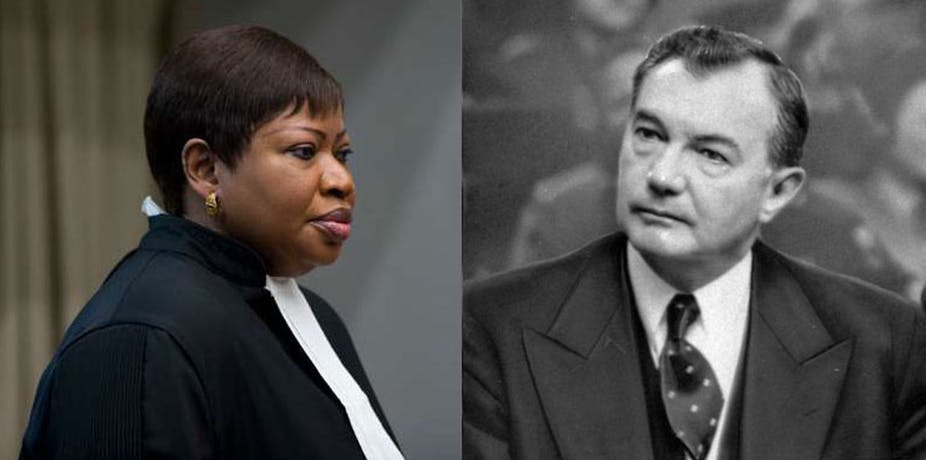
Fatou Bensouda, ICC Prosecutor, and Robert H. Jackson, two key figures in international criminal justice, from Nuremberg to The Hague.
AFP/Wikimedia
30 Jun 2019 – “Today is my second happiest day in government.”
With these words, Donald Trump’s national security advisor, John R. Bolton, hailed the decision by the International Criminal Court (ICC) to abandon its inquiry into possible breaches of international human rights laws in Afghanistan, the New York Times reported on April 12, 2019.
And the “happiest” day of his career, according to Bolton? It occurred 15 years earlier, working for then-president George W. Bush, when he persuaded the US government to withdraw its signature from the Treaty of Rome, which established the International Criminal Court.
The ICC judges in charge of the Afghanistan case considered that such an investigation would not be possible without US cooperation, but the prosecutor of the Court, Gambia’s Fatou Bensouda, has stated that she will appeal. Her request includes not only an investigation into Afghanistan but also allegations of torture in the secret prisons of the US Central Intelligence Agency (CIA) in Poland, Romania and Lithuania.
Faced with US neoconservatives’ uncompromising, blanket rejection of international criminal justice, supporters of the ICC usually invoke the precedent of the Nuremberg Trials. They highlight the active role taken by the United States in the creation of the International Military Tribunal (IMT), which tried the 21 most senior leaders of the Nazi regime between November 1945 and October 1946.
However, the call for a return to American leadership of international criminal justice is based on a problematic historical narrative that doesn’t stand up to closer examination.
Invoking the “spirit of Nuremberg”
Two weeks prior to the ICC decision, Chile Eboe-Osuji, the Nigerian judge and president of the ICC, was in Washington, DC, to see one of the last living Nuremberg prosecutors, Benjamin Ferencz (born 1920), receive the Anne Frank Award from the Dutch government.
Benjamin Ferencz, Nuremberg prosecutor
httpv://www.youtube.com/watch?v=Zwa4zRWDsvI
Eboe-Osuji hailed Ferencz as a tireless American fighter for the cause of international criminal justice. Two days later, he paid a glowing tribute to Robert H. Jackson (1892-1954), chief US prosecutor at the main Nuremberg trial, recalling “America’s contributions to international criminal justice”.
The speech was given at the annual meeting of the prestigious American Society of International Law (ASIL), on the invitation of its president, Sean D. Murphy. Eboe-Osuji characterized Jackson as a pioneer and a hero of universal justice, and an inspiring figure.
Robert H. Jackson’s speech, on 21 November 1945
httpv://www.youtube.com/watch?v=EJj6NcWHkDE
John Bolton and Secretary of State Mike Pompeo are apparently deaf to such historical arguments. On April 5, 2019, they announced that the US entry visa for ICC prosecutor Fatou Bensouda had been revoked. Thus making good on a threat voiced in 2017, when Bensouda’s office announced the opening of a preliminary investigation into war crimes committed in Afghanistan since 2002, by all parties, including the US military.
How can we explain this power struggle?
Neoconservative lawyers are gaining momentum
The rift between international criminal justice and the US government appears insurmountable. On one side, international justice professionals defending the cause of the ICC and, on the other, neoconservative lawyers who see international law as a constraint on their government’s freedom to act, both domestically and internationally.
The ICC judges’ abrupt decision to abandon the Afghanistan inquiry is seen as a forfeiture by those in the field of international criminal justice – a constellation of various organizations and stakeholders at the intersection between law, human rights advocacy and diplomacy – and also in liberal, internationally minded, legal circles. The court is accused of bowing to US pressure, and its credibility appears seriously damaged.
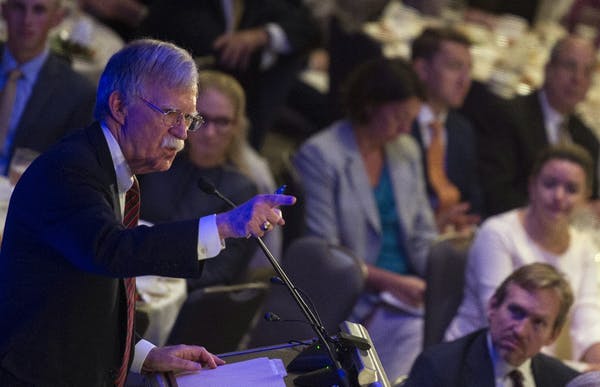
John Bolton during a speech to the Federalist Society, in Washington, DC, on 10 September 2018 – the day the US threatened to sanction judges and officials of the ICC should they continue their investigations into potential war crimes committed in Afghanistan. Andrew Caballero-Reynolds/AFP
The conflict is essentially between the ASIL, founded by James Brown Scott and Elihu Root in 1906, and members of the US Tea Party; between international legal experts like Murphy (with academic, diplomatic and international resources) and top domestic legal practitioners like Bolton, a Yale graduate and lawyer who opted for a political career in the 1980s. On a symbolic level, the conflict is accentuated by the apparent gulf between internationally minded African legal experts, who – somewhat paradoxically – are well represented on the ICC (accounting for 5 out of the 19 magistrates), and white Anglo-Saxon lawyers and diplomats on the other.
As of now, the neoconservative, unilateralist, government lawyers have come out on top. The voice of liberal, international legal professionals no longer holds sway.
Those on the side of international criminal justice – human rights interventionists or advocates of transitional justice – who hold multiple positions in NGOs, think tanks, foreign office and universities, appear to have been pushed aside.
Nuremberg: a brief multilateral exception
In the eyes of these liberal legal experts, the “spirit of Nuremberg” (in the words of Benjamin Ferencz) has deserted Washington, DC. “Will we finally apply Nuremberg’s lessons?” Ferencz asked in 2010.
In fact, the US move toward unilateralism and isolationism dates back to the early 1950s. It came after a limited period of innovation, five years at best, whose impact must not be overstated.
President Harry Truman announcing the end of World War II, 1945
httpv://www.youtube.com/watch?v=2Znbr23RQ7o
From 1944 to 1948, the administrations of Franklin Delano Roosevelt and (first and foremost) Truman actively contributed to the creation of ad hoc international tribunals, in order to try Japanese and Nazi leaders. But the rift that appeared in subsequent years is definitely not as clear-cut as it appears.
As I argue in The Nuremberg Moment, the ex post narrative is deceptive in many ways.
In retrospect, Nuremberg appears to be a short-lived, multilateral chapter in a long history of US rejection of international norms and organizations. Furthermore, it is an ambiguous exception to the rule, since it constitutes a tightly controlled period of innovation.
A narrow definition of racist crimes in international law
In 1944 and 1945, US government lawyers did indeed create the legal framework for the international Nuremberg trials. The charter of the IMT bears the traces of their particular inventiveness, and their capacity to innovate, while neutralizing any element perceived as a threat to US sovereignty.
In this regard, the laws surrounding persecution and crimes committed “on racial grounds” – that is, in the name of a racist ideology (art. 6 (c) of the IMT Charter, Aug. 8, 1945) – are a striking example.
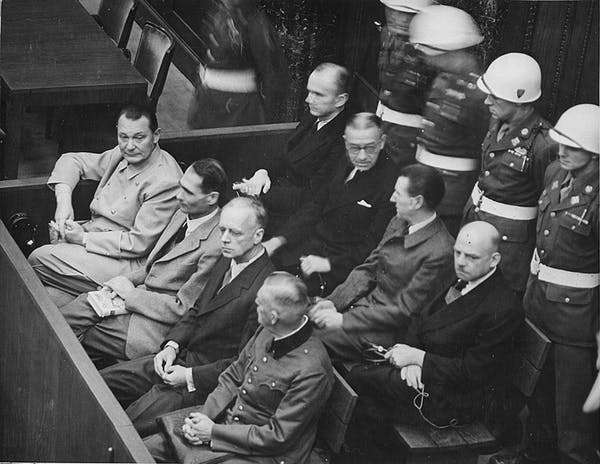
The Nuremberg Trials. From left to right, front row: Göring, Hess, Ribbentrop, Keitel; back row: Dönitz, Raeder, Schirach, Sauckel.
United States Government/Wikimedia
The mass crimes committed by Nazis against European Jews fell largely beyond the remit of the laws of war codified since the end of the 19th century. For this reason, US legal experts developed a new criminal category, the crime against humanity. At the same time, they strictly curtailed its reach, subordinating the category to higher level crimes, such as waging wars of aggression, namely “crimes against peace”.
The internal discussions during the long drafting of the IMT statutes provide proof that these experts desperately wanted to avoid creating a universal legal instrument that would grant courts the right to scrutinize the internal affairs of nation states.
The Jim Crow laws that formed the basis for racial segregation in the US and the endemic violence against African-Americans were high on their minds. This concern was almost an obsession. In July 1945, during the four-power London Conference, Robert Jackson himself flatly declared to his allied colleagues:
“The way Germany treats its inhabitants, or any other country treats its inhabitants, is not our affair any more than it is the affair of some other government to interpose itself in our problems.”
To make sure he was understood, he made veiled reference to racial discrimination and lynching on home soil:
“We have some regrettable circumstances at times in our own country in which minorities are unfairly treated […]”
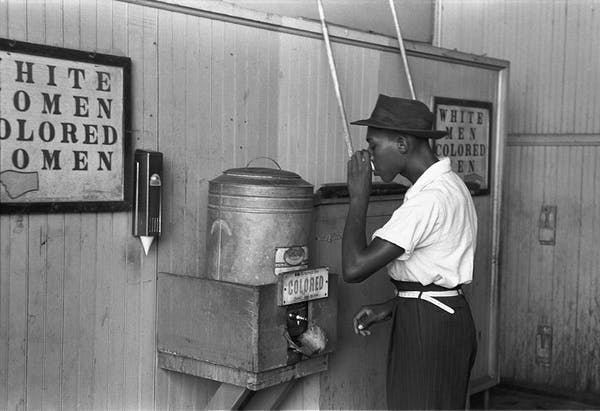
A man drinks at a ‘colored’ drinking fountain at a streetcar terminal in Oklahoma City, 1939. Russell Lee/Wikimedia
Neutralizing the Nuremberg principles
This controlled development of international (criminal) law, combining innovation and neutralization of it, was in fact a manifestation of three sets of dispositions (or inclinations) common to US legal experts: the internalization of the strict “color line”, the professional habitus of elite lawyers and the “state thinking” derived from their close ties with government.
This short period of innovation, driven by a limited circle of elite lawyers, rapidly gave way to pure and simple rejection.
A line can therefore be traced between Manley Hudson, who, as early as 1950, opposed the codification of the “Nuremberg principles” within the UN International Law Commission, as well as the creation of a permanent court, and John Bolton, who has been leading a relentless crusade against the ICC since 2002.
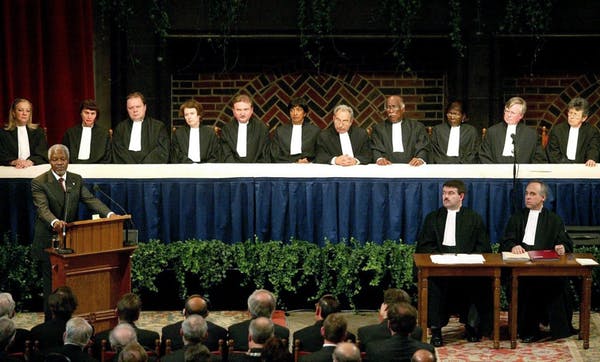
UN Secretary-General Kofi Annan gives the inaugural speech for the International Criminal Court, the very first permanent court with the power to try war crimes and crimes against humanity, at the Hague, on March 11, 2003.
Robert Vos/AFP
The fear of US citizens being prosecuted – for racist crimes in the ‘40s and ’50s , and for war crimes since the ’60s – has become an obsession. It reveals a deep belief in the notion that international law represents a threat to the interests and image of the United States. This is reminiscent of the ideology of “legalism”, analyzed in the 1960s by philosopher Judith Shklar.
In truth, the “spirit of Nuremberg” invoked by progressive lawyers and international criminal justice activists like Ferencz is based on a distorted and somewhat romanticized image of the international trials of 1945-46. The expression itself helped to build a linear, heroic narrative, continuing from Nuremberg to the Hague.
_________________________________________
Guillaume Mouralis – Historien et sociologue, chercheur au CNRS, Centre Marc Bloch (Berlin), Humboldt University of Berlin
The author recently published Le Moment Nuremberg: Le procès international, les lawyers et la question raciale (The Nuremberg Moment: The International Trial, the U.S. Lawyers and the Racial Issue), Presses de Sciences Po.
Translated from the French by Alice Heathwood for Fast ForWord.
This article was originally published in French
Republish our articles for free, online or in print, under Creative Commons license.
Go to Original – theconversation.com
Tags: History, Human Rights, ICC, Justice, Military, NATO, Nazism, Politics, Power, Racism, Social justice, Trump, UN, USA, Violence, WWII, War
DISCLAIMER: The statements, views and opinions expressed in pieces republished here are solely those of the authors and do not necessarily represent those of TMS. In accordance with title 17 U.S.C. section 107, this material is distributed without profit to those who have expressed a prior interest in receiving the included information for research and educational purposes. TMS has no affiliation whatsoever with the originator of this article nor is TMS endorsed or sponsored by the originator. “GO TO ORIGINAL” links are provided as a convenience to our readers and allow for verification of authenticity. However, as originating pages are often updated by their originating host sites, the versions posted may not match the versions our readers view when clicking the “GO TO ORIGINAL” links. This site contains copyrighted material the use of which has not always been specifically authorized by the copyright owner. We are making such material available in our efforts to advance understanding of environmental, political, human rights, economic, democracy, scientific, and social justice issues, etc. We believe this constitutes a ‘fair use’ of any such copyrighted material as provided for in section 107 of the US Copyright Law. In accordance with Title 17 U.S.C. Section 107, the material on this site is distributed without profit to those who have expressed a prior interest in receiving the included information for research and educational purposes. For more information go to: http://www.law.cornell.edu/uscode/17/107.shtml. If you wish to use copyrighted material from this site for purposes of your own that go beyond ‘fair use’, you must obtain permission from the copyright owner.
One Response to “Why the United States Rejects International Criminal Justice: Looking Back at Nuremberg”
Read more
Click here to go to the current weekly digest or pick another article:
ANGLO AMERICA:
- Ukraine War: Washington Moves on to Plan B
- Enforcing Silence on Genocide
- DC Police Refuse George Washington University Request to Arrest Students
JUSTICE:
- US Working to Prevent International Criminal Court Arrest Warrant for Netanyahu
- Five Years at Belmarsh: A Chronicle of Julian Assange's Imprisonment
- Nicaragua Hits Germany with ICJ Case for Aiding Israel in Gaza Genocide
UNITED NATIONS:

It is highly disappointing that the author of this article and so many otherwise wise and mature men and women fail to recognize the fraud Bill Browder, already approved Magnitsky legislation in a number of nations including the U.S.A., Canada and others – such sanctions-focused laws being based on the historic-magnitude Browder deception, and the massive plan to create an exclusive Western-biased, Wall Street, London, Federal Reserve, Bank for International Settlements etc. alternative to the International Criminal Court.
The level of global power and wealth of those behind the Browder-Magnitsky scandal must be immense, and might be described as “ultimate power”, or of the type where otherwise moral, intelligent and courageous individuals back off and remain silent for fear of existential risk to their very lives and those of their families.
There is no other way to describe the individuals ordering the unbelievably smothering, effective and continuing coverup of the Browder-Magnitsky scandal but as those defining ultimate power on Earth, – for who else can cause upright and honest people to cower in fear and remain silent, all the while knowing the God-awful, absolutely necessary-to-expose truth?
To be clear – the Browder-Magnitsky scandal’s magnitude is historic, horrifically serious and immeasurably important to expose. To those who read these words: the Browder-Magnitsky scandal and continuing coverup must end, and it must end NOW!!!